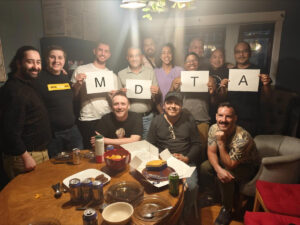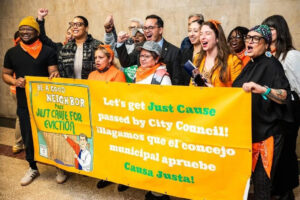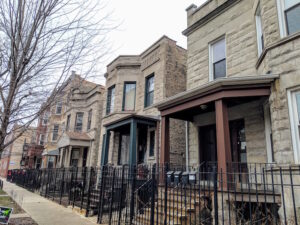
Author: Gordon Dymowski
Tenants Union in Uptown Wins $40,000 from Corporate Landlord!

After years of affordable rents under a small independent landlord, tenants at the corner of W. Montrose and N. Dayton received a horrifying holiday surprise. Right after Christmas, tenants received a notice from Rockwell Property (representing the building’s new ownership group, Montrose Investment Partners II LLC) that they had approximately 120 days to vacate their homes so their new landlord could renovate the building.
Many tenants had lived in the building for decades. Rockwell Property offered tenants a paltry $500 on the way out and a $500 credit if they moved back into the building when the renovations were done, and rents would inevitably be unaffordable for most tenants.
Fearful that they would not be able to afford to move and angry that they could be displaced so suddenly, the tenants sprang into action and formed the Mon-Day Tenants Association (MDTA) with one simple demand: if you want us to move, pay us to do so!
The demand was far from unreasonable. If the proposed Just Cause for Eviction Ordinance were law in Chicago, the landlord would have to give tenants, displaced through no fault of their own, substantial relocation assistance.
For the first month of the campaign, building ownership refused to negotiate with the MDTA. But with the help of organizers from MTO and ONE Northside, the MDTA gathered community support, escalated public pressure, and forced the owners to the table.
After weeks of intense negotiations, the MDTA approved an agreement in which the landlord waived last month’s rent and gave each unit $2,000 upon return of their keys at move-out.
MTO is proud to congratulate the MDTA on its victory. Organizing works!
Breathing Room: MTO Helps a Family Escape Unsafe Housing

Toxic Air in Residential Apartment
Mr. Thomas came through MTO’s doors as a walk-in. He was desperate for help because his apartment was constantly filled with smoke, debris, and other fumes. Despite his repeated pleas to fix the problem, his landlord had done nothing. Mr. Thomas’s seven-year-old son suffers from bronchial asthma. His unit’s noxious air exacerbated his son’s asthma, repeatedly landing him in the hospital emergency room. Mr. Thomas tried to work out a solution and even offered to pay money to the owner to let him out of his lease, but the owner denied his requests.
MTO’s Staff Attorney intervened on his behalf.
After some back and forth, the property owner learned about the potential legal consequences. As a result, they negotiated an agreement that allowed Mr. Thomas to move and receive needed relocation assistance. Now, Mr. Thomas and his son are living in a safe, healthy apartment without the threat of eviction or collections hanging over their heads.
“Just Cause” Ordinance Introduced in City Council
 On Wednesday, May 21, numerous supporters descended on Chicago’s City Council Meeting to support the introduction of the Just Cause Eviction Ordinance. The law requires landlords to have a just cause to evict a tenant. It would ban evictions due to retaliation. MTO supports passage of the just cause ordinance as a means of balancing power between landlords and tenants. If Just Cause passes, it would mean landlords would no longer have the power to threaten tenants with eviction for requesting repairs or organizing.
On Wednesday, May 21, numerous supporters descended on Chicago’s City Council Meeting to support the introduction of the Just Cause Eviction Ordinance. The law requires landlords to have a just cause to evict a tenant. It would ban evictions due to retaliation. MTO supports passage of the just cause ordinance as a means of balancing power between landlords and tenants. If Just Cause passes, it would mean landlords would no longer have the power to threaten tenants with eviction for requesting repairs or organizing.
Under the proposed law, landlords must state one of seven reasons why they are evicting a tenant. Reasons include: failure to pay rent, follow the lease rules, refusal to sign a lease, the landlord wishes to no longer rent the unit or rent it to a relative, major rehab of the unit, or convert it to condominiums. If the landlord is terminating the lease for a reason in which the tenant is not at fault, then the tenant would be entitled to relocation assistance. So while the law does not end gentrification, it does begin to move the costs of gentrification to the property owners and developers, as they are the ones who benefit. Finally, the bill would create a registry of landlords and require people who own more than 20% of the building to disclose their interest.
Upon introduction, Alderman Ray Lopez asked that the bill be sent to the rules committee. His goal is to try and bury the tenants’ rights legislation. The Chicago Housing Justice Coalition is working with Council member Desmon Yancy to get the bill out of rules and into the housing committee for a hearing.
Our New Location
In case you missed it, our new location is 601 S California at the Westside Justice Center

Advocating Using the Residential Landlord and Tenant Ordinance (RLTO)

When Naeema moved into her new apartment, she was excited and thinking about the future in her new home. Within the first month, problems began appearing: the toilet would not flush, water pressure was not enough for a proper shower, and roaches scuttled across her floors.
Despite multiple attempts to get her property manager to address these problems, her concerns went unanswered, leaving her feeling stuck and frustrated. That is when Naeema reached out to MTO for help. After listening to her concerns, hotline counselors explained her rights under the Residential Landlord and Tenant Ordinance (RLTO), including her remedies for dealing with a neglectful landlord and her right to complain to Chicago’s Department of Buildings for an inspection.
With this information, Naeema felt empowered to act. Together, we helped her draft a letter to the management company detailing the issues and her rights as a tenant. The results were immediate.
Management agreed to let Naeema out of her lease without penalty and offered to refund her first month’s rent and move-in fee. Following this breakthrough, Naeema conducted a walkthrough of the apartment with the property manager. The unit was in the same condition as when she moved in, and the manager confirmed the refund and lease termination. Within that same week, Naeema picked up her refund check, covering her first month’s rent and move-in fees in full. She then moved out, leaving behind the stressful conditions and regaining peace of mind. Naeema’s persistence, combined with the right support and knowledge of her tenant rights, turned a demanding situation into a positive resolution. Now, she is ready for a fresh start in a home that meets her needs.
A Life Disrupted: Lead in the Home
 When a child is harmed by lead within the home, family life gets immediately upended. This was true for Michael and Eileen Buchanan, whose 14-month-old tested positive for elevated blood lead levels. A Chicago city inspector confirmed high lead levels throughout their unit.
When a child is harmed by lead within the home, family life gets immediately upended. This was true for Michael and Eileen Buchanan, whose 14-month-old tested positive for elevated blood lead levels. A Chicago city inspector confirmed high lead levels throughout their unit.
Right away, Mr. and Mrs. Buchanan changed their lives to protect their child’s health. The Buchanan family began to look for a safe, lead-free place to move. Since they had neither the means nor the opportunity to move immediately, they altered their apartment unit. Their once-cozy home became unrecognizable.
The Buchanans, when possible, traveled to Michigan at their own expense to stay with family and to avoid their unit. Medical bills piled up. Mr. Buchanan had to take off work to focus on taking care of his 14-month-old, putting his job at risk. Adding to the stress was the terror of not knowing how the lead would impact their child, and whether their child would experience long-term health consequences commonly associated with elevated blood lead levels. With help from MTO’s Healthy Homes Organizer, LiMei Vera, and MTO’s Staff Attorney, Philip DeVon, the Buchanans were able to successfully negotiate with their Landlord. While they secured a lease termination agreement and ample relocation assistance, they did not come out unscathed.
The Buchanans’ story is representative of a larger problem faced by tenants in Chicago: without proactive inspections, great responsibility falls on tenants to protect their children from invisible hazards in the unit. When their children are harmed by lead in the unit, they must abruptly make great adjustments in order to keep their children safe. These adjustments are costly – both in terms of time and money – and occur during a time of emotional distress and turmoil. With stories like the Buchanans’ happening throughout the city, our response is clear: we need proactive inspections of all rental units in order to protect children and their families from hazards in the home.
Organizing Works – Past Campaigns By Ward
 Organizing around tenant rights is about winning through building community and collaboration. We are proud of our work in helping tenants win our consistent victories in the city of Chicago. Check out several of our recent tenant organizing successes in this ever-growing list.
Organizing around tenant rights is about winning through building community and collaboration. We are proud of our work in helping tenants win our consistent victories in the city of Chicago. Check out several of our recent tenant organizing successes in this ever-growing list.
2025
- N Dayton (46th Ward) – Building tenants faced forced relocation due to the landlord’s desire to renovate the building. After forming a tenant union, residents gained rent forgiveness and other benefits.
- More efforts forthcoming!
2024
- S. Stony Island (8th Ward) – Tenants expressed concerns about management and security and wanted to form a tenant association. Tenants organized to form an association and, through direct action, ensured that new security measures were implemented.
- N. Sheridan (48th Ward) – Building tenants faced various safety issues, including fire prevention, bedbugs, and poor building management. Tenants mobilized and formed a union, presenting management with their demands. Results included repairing fire escapes and the building’s elevator and mitigating a severe outbreak of bedbugs.
- S. Daniel Drive (9th Ward) – Tenants organized around the landlord’s reluctance to make necessary repairs. Despite landlord retaliation, tenants organized around holding the landlord accountable. Not only were repairs made, but tenants formed an association to continue efforts to ensure building quality and safety.
- S. Drexel (20th Ward) – Tenants organized to focus on issues of poor property management. After establishing a union, tenants forced landlords to improve security and ensure further cooperation.
- W. Cermak Rd (20th Ward) – After receiving significant rent increases without remediation for healthy home issues, tenants organized to assert their rights. After securing legal counsel and withholding rent, tenants received significant repairs (including windows and floors) and improved pest control efforts.
- S. Champlain (4th Ward) – Tenants organized around health and welfare issues caused by 3500 pounds of sanitary waste and other debris. Results included inspection, engagement of the alderman, and negotiations.
2023
- W 103rd (19th Ward) – New property management company provided no-cause lease terminations for over 100 residents across six buildings. Tenants organized and received rent forgiveness, rental reimbursement, and some received lease extensions for one year.
- E. 79th (6th Ward) – Landlord attempted to intimidate tenants by charging for refrigerators, visiting the property with armed security, and threatening eviction. Thanks to tenant organizing, landlord was forced to make changes including security screen doors, tuck pointing, heat, installing a new stove, and tenant rent forgiveness
- S. Burley (10th Ward) – Tenants organized around issues concerning lack of repairs and the resulting landlord harassment and retaliation. Efforts around organizing resulted in hiring an extermination company, improving security, and increased tenant input on renovation priorities.
- E. 41st St (3rd Ward) – Organizing around efforts to reopen the building’s community room, tenants formed an association to address this and other issues, including smoking in units, ventilation issues, and disrespectful management.
- E. 38th Street (3rd Ward) – Tenants organized around a series of maintenance issues including broken washers and dryers, bedbug infestations, and a flooded community room. Despite landlord harassment and intimidation, tenants successfully organized and had washers and dryers fixed, bedbugs exterminated, and an improved community room with increased attendance.
- N. Hudson (27th Ward) – Forming a union to counter management harassment and security issues, tenants were able to have needed repairs made and improve security.